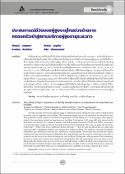บทคัดย่อ
เมื่อผู้สูงอายุในภาวะพึ่งพิงจำเป็นต้องย้ายจากที่อยู่อาศัยเดิมเข้ามายังสถานบริการระยะยาว จะต้องปรับตัวต่อการเปลี่ยนแปลงในชีวิตครั้งสำคัญ ซึ่งการเปลี่ยนแปลงนี้ส่งผลกระทบต่อจิตใจและสังคมของผู้สูงอายุ งานวิจัยนี้เป็นการศึกษาเชิงคุณภาพเกี่ยวกับประสบการณ์ของผู้สูงอายุในภาวะพึ่งพิง ในด้านการปรับตัวและมุมมองชีวิตเมื่อย้ายเข้าสู่สถานบริการ โดยทำการสัมภาษณ์เชิงลึกผู้สูงอายุที่มีอายุ 60 ปีขึ้นไปที่มีความจำเป็นต้องพึ่งพาความช่วยเหลือด้านใดด้านหนึ่ง (partially impaired ADLs or ADLs) และย้ายเข้ามาอาศัยอยู่ในสถานบริการอย่างน้อย 6 เดือน จำนวน 19 คน จากสถานบริการ 5 แห่ง ใช้วิธีการสัมภาษณ์เชิงลึกแบบเปิดประเด็นประวัติชีวิตเดิมของผู้สูงอายุ ประสบการณ์ชีวิตก่อนย้ายมาสู่สถานบริการระยะยาว และช่วงที่อยู่อาศัยจนถึงปัจจุบัน มุมมองชีวิตหลังจากย้ายเข้ามาจนถึงปัจจุบัน โดยมีการบันทึกการสัมภาษณ์ด้วยเทปอัดเสียง และวิเคราะห์เนื้อหาโดยผู้วิจัยหลักและผู้วิจัยรอง ทำการอ่านทบทวน ตีความ จัดกลุ่มประเด็นต่างๆ (independent coding) ผลการวิเคราะห์พบว่า ผู้สูงอายุที่มีการตัดสินใจย้ายที่อยู่อาศัยเองโดยไม่มีการบังคับ รวมทั้งได้มีการหาข้อมูลเกี่ยวกับสถานบริการในแต่ละแห่งมาก่อน มักจะมีการปรับตัวไปในทิศทางที่ยอมรับและพร้อมที่จะเรียนรู้กฎเกณฑ์ในสถานบริการ สำหรับกลุ่มผู้สูงอายุที่ไม่ได้ตัดสินใจย้ายที่อยู่อาศัยเอง แต่มีความจำเป็นทำให้ต้องตัดสินใจย้าย หรือมีความขัดแย้งกับทางครอบครัว กลุ่มนี้มีความเสี่ยงสูงต่อโรคซึมเศร้า สำหรับมุมมองชีวิตนั้นพบว่าผู้สูงอายุมีความเข้าใจในวัฏจักรชีวิตการเกิด แก่ เจ็บและตายมากขึ้นจากการเผชิญกับความเจ็บป่วยและความตายของผู้สูงอายุด้วยกัน
บทคัดย่อ
As older persons moving through the stage of dependence and seeking for help, some of them needed
to receive care in long-term care facilities. This transition period can be very emotional and stressful event.
This qualitative study aimed to examine the experiences of Thai elderly (n = 19) focusing in their adaptations
in the transitional period in long-term care facilities. Participants (≥ 60 years old) who moved to the
long-term care facilities for at least 6 months and had partially impaired of IADLs or ADLs, were interviewed
using open-ended questions. Example of the questions included: “How do you make the decisions
of moving?“, “What were your experiences before moving?“, “How do you feel about the new place and
come up with?” Qualitative results were analyzed by content analysis. The analysis was made to find the
similarities and differences between the experiences of participants. The results showed that the elderly
experienced their transitional period differently. Key determinant was the extent to which they were able to
control over the decision to move to long-term care facilities. Participants who preserved their autonomy
learned to adapt and accepted the transitional period better than the participants who lost their control.
Meanwhile the elderly who were forced to move and had family conflicts, tended to have depression. Facing
death and functional decline, some elders gained the concepts of life cycle and became more calm and
motivated to modify their behaviors for maintaining their capability of livings as long as they could.


